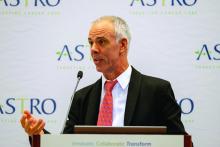Stereotactic ablative radiation therapy (SABR) may be able to extend progression-free survival (PFS) among patients with oligometastatic prostate cancer, based on results from the phase 2 ORIOLE trial.
SABR appeared to control disease, in part, by triggering a systemic immune response, reported lead author Ryan Phillips, MD, PhD, chief resident of radiation oncology at Johns Hopkins Sidney Kimmel Cancer Center in Baltimore, at the annual meeting of the American Society for Radiation Oncology. This is a particularly noteworthy finding, since prostate cancer is generally considered to be immunologically cold, Dr. Phillips explained.
The ORIOLE trial also demonstrated how prostate-specific membrane antigen (PSMA)–based PET/CT scans can be used to more accurately predict metastasis by detecting lesions that would otherwise be missed by standard imaging.
“There’s a hypothesis that these first few sites of spread pave the way for additional widespread metastasis down the road,” Dr. Phillips said, “and that if we can treat all detectable disease early enough, we may be able to provide long-term control or in the best-case scenario, be able to cure these patients of early metastatic disease.”
The trial involved 54 men with recurrent, hormone-sensitive prostate cancer who had been previously treated with radiation therapy or surgery. Additional eligibility requirements included one to three lesions that were 5 cm or smaller, detectable by MRI, CT, or bone scan; a prostate-specific antigen (PSA) doubling time of less than 15 months; and an Eastern Cooperative Oncology Group performance status of 2 or less.
Patients were randomized in a 2:1 ratio to receive either SABR or observation, with follow-up every 3 months including physical exam and PSA measurement, and at 6 months, CT and bone scan. The primary endpoint was disease progression at 6 months.
In addition to this protocol, biomarker correlative analyses were performed, including PSMA-based PET/CT, T-cell clonality testing, and circulating tumor DNA (ctDNA) assessment.
Results showed that significantly fewer men treated with SABR had disease progression at 6 months (19% vs. 61%; P = .005). This benefit extended beyond the primary endpoint, as median PFS among patients treated with SABR was not yet reached after more than a year of follow-up, while those in the observation group had a median PFS of 5.8 months (P = .0023).
“Clinically, this is promising,” Dr. Phillips said, “but we also were really interested in learning more about oligometastatic prostate cancer, and something that sets ORIOLE apart are the correlative studies.”
The first of these studies involved PSMA-based PET/CT, which can identify lesions that may be missed or underappreciated with conventional imaging. Within the SABR group, 35 of 36 men had PSMA-based PET/CT performed at baseline and 6 months later. Of these, 19 had all PSMA-based PET/CT–detectable lesions treated with SABR (total consolidation), while 16 had subtotal consolidation. This difference was predictive of outcome, as only 16% of patients with total consolidation developed new lesions 6 months later, compared with 63% of those who had subtotal consolidation (P = .006).
“Not only are we treating the disease we’re detecting, but it seems to be preventing the development of new metastases outside the areas that we treated,” Dr. Phillips said. “This also held when we looked at points beyond 6 months,” he added.
Further testing showed that SABR triggered a systemic adaptive immune response involving expansion of T-cell clones. “There’s a lot more activity and changes within the immune system that were only seen within the SABR arm,” Dr. Phillips said, noting that these changes were “similar in scope to what we see after a vaccination.”
Finally, the investigators assessed ctDNA, which showed that men with at least one high-risk mutation had similar outcomes regardless of treatment group; in contrast, those without any high-risk mutations had significantly better PFS when treated with SABR.
“These are low sample size, hypothesis-generating experiments,” Dr. Phillips said, “but it is promising that there may be measurable baseline factors that will help us decide which patients are likely to benefit from this approach, and which would really be better served with an alternate treatment strategy.”
Session moderator Anthony Zietman, MD, of Massachusetts General Hospital, Boston, suggested that the ORIOLE trial could have a big future. “This is a small study, but it’s a prospective study, and the findings are really provocative,” Dr. Zietman said. “Just imagine, if there was a patient with just two or three metastatic lesions, and by irradiating those, you could liberate proteins from the destroyed metastases, generate an immune response, and suppress the development of new metastases, that will be something extraordinary. So this trial will be followed very closely as it seems to be hinting at something that’s a bit of a Holy Grail in oncology.”
The investigators disclosed relationships with RefleXion Medical, Pfizer, Genentech, and others.
SOURCE: Phillips R et al. ASTRO 2019. Abstract LBA3.



